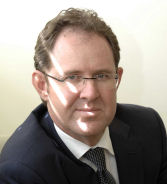Niall Olver has turned a small South African Learjet distributorship into one of the world's biggest business aviation services organisations, with fixed-base operations in four continents, a fleet of more than 100 managed aircraft, and the rights to sell Bombardier business jets in 30 countries. Now the man behind ExecuJet for 14 years is transforming a manufacturer of gliders and aerobatic trainers, tucked away in the German countryside, into a major business jet manufacturer, after buying the company behind the all-composite Grob SPn light jet a year ago.
Olver had been approached earlier in the decade by the head of the Grob family, who was keen for financial backing to develop Grob Aerospace beyond its niche market. At the time, the company felt its best prospect was a single-engined turboprop. But Olver worked with Grob to instead develop the Williams FJ44-3A-powered twinjet, before it was launched it to a surprised business aviation community at the 2004 Paris air show as a partnership between the manufacturer and ExecuJet.
Separate entities
As chief executive of both ExecuJet and Grob Aerospace, Olver devotes about a third of his time to each - they remain separate entities, although they share a head office in Zurich. The remainder of his hours are spent on what he describes as "other projects". Since acquiring Grob Aerospace, he has passed the day-to-day running of ExecuJet to a chief operating officer, Gerrit Basson. ExecuJet also acts as worldwide distributor for the SPn, except in North America, where Grob has set up its own sales and support operation, with a head office in Portsmouth, New Hampshire, and a network of third-party service facilities.
Niall Olver: keen to take ExecuJet into Russia and India |
The SPn test programme is progressing towards what Olver hopes will be US and European certification in the second quarter, despite the schedule having been jolted by the loss of its second prototype in November 2006, when an accident during a demonstration killed the chief test pilot. With an orderbook that Olver says has "passed the 70 mark" and an overall 10-year sales target of 400 aircraft, the factory, in Tussenhausen-Mattsies, near Munich, is gearing up to build 40 SPns in the first full year. However, capacity can "easily double to 80 for a modest investment", he adds.
Although wrongly classified by many as a very light jet when it was unveiled at the Paris air show in 2004, and initially pitched by Grob itself as a utility aircraft suited to third-world rugged operating conditions, the eight-seat SPn has widened its appeal. "Originally the market interpreted it as a pick-up truck," says Olver, who began his career with IT giant IBM in South Africa in the mid-1980s after three years as a pilot with the country's air force. "We've now dropped the word utility, while still pushing its attributes as a single-pilot, rough field-capable aircraft."
Originally too, Grob did not hold out much hope of success in North America, where its name and heritage were largely unknown. "We were quite surprised at how many we sold off the cuff," says Olver. "The US market promises to be bigger than I expected, with around 50% of our sales." Although many US buyers are "coming out of" larger turboprop aircraft such as Pilatus PC-12s and Beechcraft King Airs, Olver says what gives the SPn its competitive edge in the jet market is its cabin size - 11.5m3 (405ft3). "That's 95% of a [Cessna] Excel, but at 65% of the price. We're head to head in competition with the [Embraer] Phenom 300 and [Cessna] CJ4." A new Porsche Design cabin revealed at September's National Business Aviation Association convention in Atlanta also further put paid to the "pick-up" image.
Despite its rapid growth over the past decade, ExecuJet is still looking to expand into other territories. The company opened its first operation outside South Africa in Copenhagen in 1997 (although its registered office had always been in Zurich). In May this year, Irish entrepreneur Dermot Desmond bought a majority shareholding in the business, which also has FBOs in Sydney Monterrey, Mexico and Dubai, as well as a maintenance joint venture with Bombardier and Lufthansa Technik in Berlin. Although the former owner of London City airport is not taking an executive role at the company - he becomes chairman - his investment provides the funds to take ExecuJet to its next stage of development, says Olver.
Adding value
Olver's initial strategy with ExecuJet when he was taken on as chief executive at its Johannesburg operation in 1993 was to "employ the principles I learned in the mainframe business of adding value to the business". To the Learjet sales and maintenance activities, he bolted on aircraft charter, "so we were offering a solution, not just hardware. People don't generally buy a business jet because they want an aircraft. They want a solution," he says.
Once the "business model was perfected" and revenues began to grow, Olver began to look outside Africa. After Scandinavia, the Middle East was next, initially with a small sales operation in Dubai, but now with a large FBO opened last year. Sydney followed in 2000, since when Olver says that ExecuJet has "replaced every Gulfstream in Australia with a Global Express". ExecuJet became a third partner in the LBAS joint venture in Berlin in 2004.
Giving a hint as to what his "other projects" might include, Olver wants to expand into Russia and India in the "next 24 months" and after that "we'll probably fill the gap up from Australia and across from India". "Apart from a dip after 9/11, it's been a pretty busy time," he says.
Source: Flight International
























